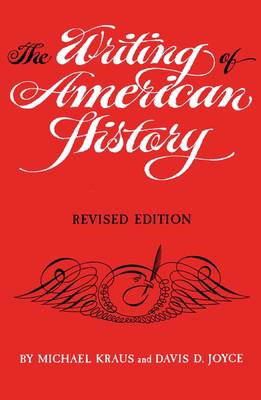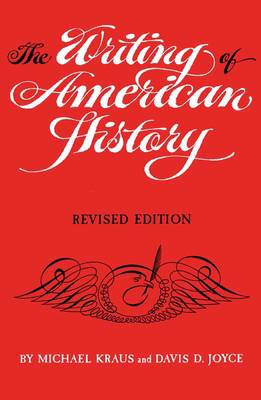
- Retrait gratuit dans votre magasin Club
- 7.000.000 titres dans notre catalogue
- Payer en toute sécurité
- Toujours un magasin près de chez vous
- Retrait gratuit dans votre magasin Club
- 7.000.0000 titres dans notre catalogue
- Payer en toute sécurité
- Toujours un magasin près de chez vous
The Writing of American History, Revised Edition
Michael Kraus, Davis D Joyce
Livre broché | Anglais
32,45 €
+ 64 points
Description
Events which become historical, says Michael Kraus, do not live on because of their mere occurrence. They survive when writers re-create them and thus preserve for posterity their otherwise fleeting existence. Paul Revere's ride, for example, might well have vanished from the records had not Longfellow snatched it from approaching oblivion and given it a dramatic spot in American history. Now Revere rides on in spirited passages in our history books. In this way the recorder of events becomes almost as important as the events themselves. In other words, historiography-the study of historians and their particular contributions to the body of historical records-must not be ignored by those who seriously wish to understand the past. When the first edition of Michael Kraus's Writing of American History was published, a reviewer for the New York Herald Tribune wrote: "No serious study of our national origins and development can afford not to have such an aid as this at his elbow." The book quickly came to be regarded as one of the few truly standard general surveys of American historiography, invaluable as a reference book, as a textbook, and as a highly readable source of information for the interested general reader. This new edition with coauthor Davis D. Joyce confirms its position as the definitive work in the field. Concise yet comprehensive, here is an analysis of the writers and writings of American history from the Norse voyages to modern times. The book has its roots in Kraus's pioneering History of American History, published in 1937, a unique and successful attempt to cover in one volume the entire sweep of American historical activity. Kraus revised and updated the book in 1953, when it was published under the present title. Now, once again, the demand for its revision has been met. Davis D. Joyce, with the full cooperation and approval of Kraus, has thoroughly revised and brought up to date the text of the 1953 edition. The clarity and evenhandedness of Kraus's text has been carefully preserved. The last three chapters add entirely new material, surveying the massive and complex body of American historical writing since World War II: "Consensus: American Historical Writing in the 1950s," "Conflict: American Historical Writing in the 1960s," and "Complexity: American Historical Writing in the 1970s-and Beyond." Michael Kraus, Professor Emeritus at City College of New York, received the Ph.D. from Columbia University and in his long career established himself as one of America's foremost historiographers. Davis D.Joyce is Professor Emeritus of History, East Central University, Ada, Oklahoma, and is the author of HOWARD ZINN: A RADICAL AMERICAN VISION and ALTERNATIVE OKLAHOMA: CONTRARIAN VIEWS OF THE SOONER STATE. He teaches part-time at Rogers State University, Claremore, Oklahoma.
Spécifications
Parties prenantes
- Auteur(s) :
- Editeur:
Contenu
- Nombre de pages :
- 464
- Langue:
- Anglais
Caractéristiques
- EAN:
- 9780806122342
- Date de parution :
- 15-10-85
- Format:
- Livre broché
- Format numérique:
- Trade paperback (VS)
- Dimensions :
- 154 mm x 235 mm
- Poids :
- 635 g

Les avis
Nous publions uniquement les avis qui respectent les conditions requises. Consultez nos conditions pour les avis.






